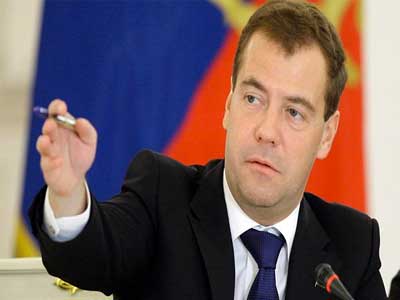
The world has plunged into a “new Cold War”, the Russian premier said Saturday, as East-West tensions over Syria and Ukraine dominated a gathering of world leaders in Germany.
US Secretary of State John Kerry told the Munich Security Conference that Russia must stop targeting moderate rebels in Syria and pull its troops out of Ukraine.
“To date, the vast majority of Russia’s attacks (in Syria) have been against legitimate opposition groups,” Kerry told the audience.
“To adhere to the agreement it made, Russia’s targeting must change,” he said, referring to the international deal forged on Friday, in which foreign ministers agreed to seek a “cessation of hostilities” in Syria within a week.
“This is the moment. This is a hinge point. Decisions made in the coming days and weeks, and a few months could end the war in Syria –- or could define a very difficult set of choices for the future.”
He spoke shortly after Russian Prime Minister Dmitry Medvedev said the world had “slid into a new period of Cold War.”
“Almost every day we are accused of making new horrible threats either against NATO as a whole, against Europe or against the US or other countries,” Medvedev said.
– ‘This is your aggression’ –
A panel of eastern European leaders were eager to add to the criticism of Russia’s assertive foreign policy.
“Every single day, Russian troops, Russian weapons, Russian ammunition penetrate into my country,” said Ukraine President Petro Poroshenko.
He addressed Russia’s president, who was not present, saying: “Mr (Vladimir) Putin, this is not a civil war in Ukraine, this is your aggression. This is not a civil war in Crimea, this is your soldiers who occupied my country.”
Kerry emphasised that sanctions on Russia would remain in place until it implements all aspects of the Ukraine peace agreement reached in Belarus’ capital Minsk last year.
“Russia has a simple choice: fully implement Minsk or continue to face economically damaging sanctions,” he said.
An emotional Poroshenko also warned that “pro-Russian parties” were undermining Europe from within with an alternative set of values.
“Isolationism, intolerance, disrespect of human rights, religious fanatics, homophobia — this alternative Europe has a leader. His name is Mr Putin.”
By contrast, Medvedev had earlier criticised the expansion of NATO and EU influence deep into formerly Soviet-ruled eastern Europe, which Russia still sees as its sphere of influence.
“European politicians thought that creating a so-called belt of friends at Europe’s side, on the outskirts of the EU, could be a guarantee of security, and what’s the result?” he said. “Not a belt of friends but a belt of exclusion.”
But he also struck a more positive note, saying: “Our positions differ, but they do not differ as much as 40 years ago when a wall was standing in Europe.”
– ‘Coercion and intimidation’ –
NATO secretary general Jens Stoltenberg also addressed the forum, vowing to combine a firm stance against Russia with more dialogue.
“We have seen a more assertive Russia, a Russia which is destabilising the European security order,” he said. “NATO does not seek confrontation and we don’t want a new Cold War. At the same time our response has to be firm.”
NATO is “undertaking the biggest reinforcement to our collective defence in decades, to send a powerful signal to deter any aggression or intimidation,” Stoltenberg added. “Not to wage war, but to prevent war.”
Earlier this week, Stoltenberg announced that plans had been approved for an increased NATO presence in eastern Europe — which sources said would involve between 3,000 and 6,000 troops rotating through the region.
“Russia’s rhetoric, posture and exercises of its nuclear forces are aimed at intimidating its neighbours, undermining trust and stability in Europe,” Stoltenberg said in Munich.
Russian Foreign Minister Sergei Lavrov hit back, criticising the “fashion for Russophobia in some capitals” and the “failure of NATO and the EU to fully cooperate with Russia”.



